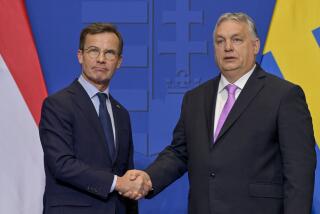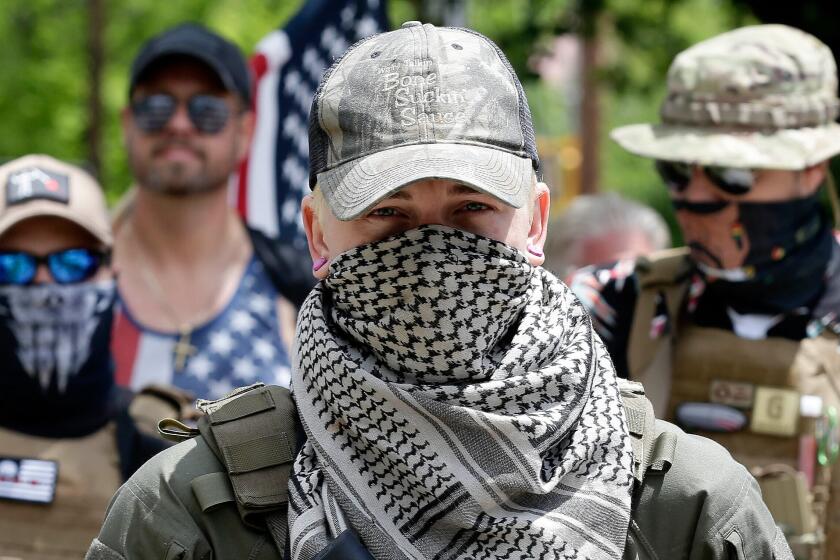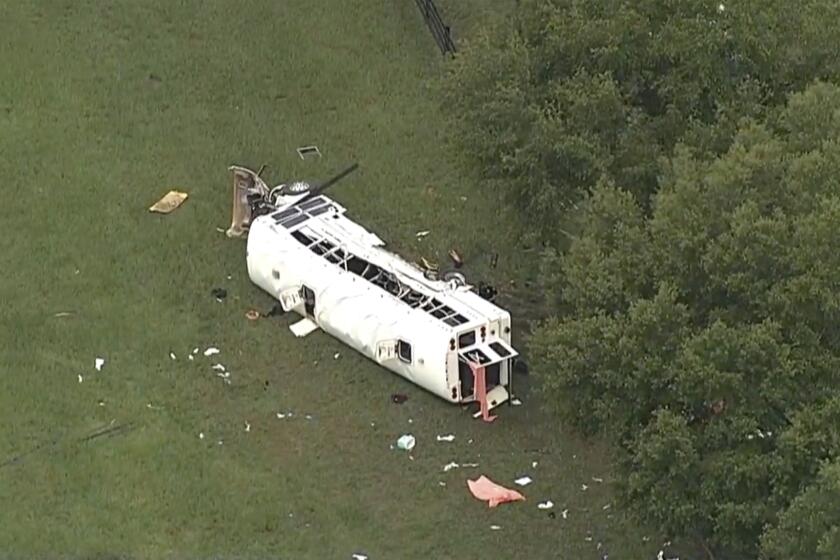Croats’ Aggression Shows Bosnia Alliance’s Tension
In another show of the destructive tensions between Muslims and Croats in postwar Bosnia, NATO forces were called into action to dislodge a band of Croatian police disrupting Wednesday’s transfer of a Serb-held suburb to government control.
The episode in the Sarajevo suburb of Hadzici showed the ever-deepening schism between Muslims and Croats, nominal allies whose cooperation is the foundation of the U.S.-brokered Bosnian peace accord. It came as the two groups exchanged bitter accusations over each other’s ulterior motives in forming the Muslim-Croat federation that is supposed to govern half of Bosnia-Herzegovina.
Among many new and divisive sources of tension, diplomats and North Atlantic Treaty Organization officials said in interviews, is a covert intelligence agency that the Bosnian government created within its Interior Ministry and that Bosnian Croats fear will be used to spy on them.
“The federation is in trouble,” said a European diplomat in Sarajevo. “The next war in Bosnia could be a Bosniak [Bosnian Muslim]-Croat war.”
The existence of the agency came to light last month when NATO forces raided what they described as an Iranian-run terrorist training camp in the village of Podgovrelica, near Sarajevo. Originally, NATO saw the camp as a potential threat to American forces, but the updated assessment suggests that the greater concern is that the spy techniques would be used internally.
Eight Bosnians and three Iranians were apprehended at the site. The Bosnians were apparently employed by the agency, which is known by its initials in English--AID, the Agency for Investigation and Documentation--and reports to the Muslim-led government but has been concealed from the federation, according to the diplomats and other sources.
“It shows the great level of distrust between the two federation partners,” said the European diplomat.
While the Muslim leadership has always questioned Croats’ commitment to the federation, Croatian politicians are becoming increasingly vocal about what they see as efforts by Muslim hard-liners within the government to take over and subjugate Croatian participation.
Warning of a “new war,” the Croatian president of the federation, Kresimir Zubak, was quoted in a Croatian newspaper this week as saying that Muslim attempts to force Croats into second-class minority status will destroy the federation.
It is the secrecy surrounding the AID agency that makes it of particular concern to Croats as well as NATO and Western diplomats. While it would be expected that the training camp would be kept secret from enemies, NATO intelligence sources expressed surprise that Bosnia’s allies were unaware of it.
But numerous threats to the survival of the federation are far less covert, as Wednesday’s Hadzici standoff proved.
Officials of the NATO-led peace-enforcement mission said that about 20 uniformed Croatian police seized a police station in Hadzici, just west of Sarajevo, until more than 100 NATO combat troops in 20 armored vehicles forced them out.
The Croats, in what NATO labeled a “clearly provocative” act, were protesting the low number of their ethnic group being included in the new federation police force. Of about 70 officers assigned to Hadzici, only five are Croats. The United Nations said this reflects the ethnic makeup registered in Bosnia’s prewar 1991 census.
The Croats, U.N. sources said Wednesday, are also eager to hold on to the wartime black market trade they developed with the suburban Bosnian Serbs who until recently were laying siege to Sarajevo.
More to Read
Start your day right
Sign up for Essential California for news, features and recommendations from the L.A. Times and beyond in your inbox six days a week.
You may occasionally receive promotional content from the Los Angeles Times.







